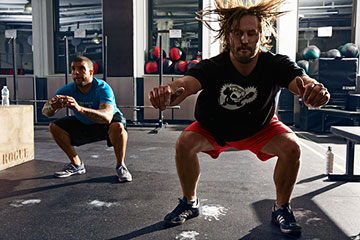
CrossFitters work out in a New York City box. CrossFit preaches constantly varied, high-intensity, functional movement.
(3 of 5)
Boxes are social but rarely mimic the pickup scene of generic gyms. "It's scary for women to try to lift weights in a regular gym," says Jessica Singer, an economics Ph.D. student, after a workout at a New York City CrossFit box. "It's such a culture of macho men." Singer, who has 10 years of experience as a dancer, has been going to CrossFit for four months. "I didn't think I'd like the social aspect," she says. "You're all sweaty--it's just not fun. But it's nice to have people egg you on. I wouldn't push myself as much alone as I do here."
But all that egging on has invited questions about CrossFit's safety. After an intense eight-minute warm-up, Jenifer Green, 35, took a break about four minutes into an early-November workout. "My arms felt like spaghetti," says Green, who owns a supplement company in Pottstown, Pa. The burpees and wall balls were too much.
A pair of trainers didn't look pleased. Come on, you're better than that, they told Green. Keep pushing. After a few minutes, she resumed churning on the rowing machine, followed by box jumps, push-ups, medicine-ball lifts and runs around the building.
Green felt more dehydrated than usual when she left that night. Over the next week, her arms, which she could barely move, started to swell. Brushing her teeth or washing her face caused crushing pain. "I would have rather given birth," says Green, a mother of three.
A few days later, "my arms looked like Robin Williams' in Popeye," Green says. "My feet looked like footballs. My toes were like Vienna sausages." She reached the emergency room just in time; doctors diagnosed her with exertional rhabdomyolysis, a potentially fatal condition in which muscle fibers break down from overexercise, leading to the release of a protein, myoglobin, into the bloodstream. Too much myoglobin can damage the kidneys. Green was prescribed 30 days of bed rest and urged to drink vats of water.
Two months later, Green takes responsibility for her rhabdo; her competitive urges took over. She even plans on returning to CrossFit. But she doesn't absolve CrossFit either. "That in-your-face, keep-going mentality--sometimes you wonder, Are you serious?" says Green, who defied her doctor's orders and returned to work a week after leaving the hospital. "But that's the extremist CrossFit culture."
The company says it doesn't teach trainers to push people past their limits. Trainers are made fully aware of the risks of rhabdo and given tips on how to prevent it. CrossFit has even adopted another cartoon mascot: Uncle Rhabdo, an exhausted, bloodied clown attached to a dialysis machine, with a kidney and his large intestine lying on the floor. "People look at that, and they get offended and say, 'You guys aren't taking this seriously,'" says Berger. "And the whole point--it's supposed to get people's attention. The last thing we want is somebody who's uneducated or unaware of this condition giving themselves a serious case of it."
